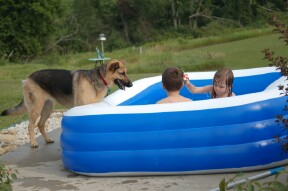Call of the Sirens (Part VIII)
Thus are pre-rounds on the surgical team.
Heaven on a scalpel.
Rules:
- Always round before the patient is awake and family members are present. Talking to patients and especially family, wastes time. The nurses can read your note and take care of all that touchy-feely bullshit.
- Always have the lightest team member examine the patient, the better to creep in and out without waking anyone. (See above)
- Placing the stethoscope in one place allows you to (theoretically) examine all 3 organ systems (lungs, heart, gut) without all that needless mucking about that internists are so fond of, placing their stethoscopes here and there around the torso.
- All this stealth is vital for the team to have rounded on all the inpatients ahead of time in order to be in the operating room by 7 am sharp: gloved, gowned, scrubbed, surgical instruments in hand, attending pimping away. ("So. Dr Piffle. What is the order in which one encounters the vessels that supply the GI tract coming off the aorta, in descending order and is each anterior or posterior to their corresponding venous counterparts?" "Errrrrrrrrrrrrrr....")
Ah. The surgical rotation, where one learns the 4 cardinal universal rules of surgery:
- Trust no one.
- Eat when you can, sleep when you can, pee when you can.
- The esophagus is not your friend.
- Don't fuck with the pancreas.
Contrast these with the 4 rules of internal medicine, as told to me by a rather cool attending:
- Medicine is not a science, it is an art based on science.
- There are at least 2 ways to do everything.
- Every patient is an n=1.
- If you're not having fun, something's wrong.
Taking #4 up there: see, the thing about surgery, is that it is fucking fun and really simple. Not the surgeries themselves, but the approach to medicine. You are congratulated for the shortness of your notes and your ability to turf (transfer the care of) any patient who is not in need of surgery right now, to a non-surgical service. You don't have to waste time on all this differential diagnosis stuff. Who the hell cares why Mrs Jones is demented, all you care about is if Mrs Jones is a surgical candidate. If not, turf her.
Turf her good.
(An aside-- that's one thing that reallyreally bugs me about all these medical shows. See, there are strongly delineated lines between medicine and surgery, especially in a teaching hospital. Surgeons operate and do the post-operative (including the surgical intensive care unit) care. They do not have anything to do with medical issues. They don't manage the insulin. They do manage the pain meds. The patient with some sort of unknown fever, unless there's an obvious surgical source, would never be admitted to a surgical service. The patient would be admitted to medicine, perhaps with a surgical consult as to whether or not surgery might be indicated, but NEVER to a surgical team. Also? There are distinct surgical sub-specialities. Don't mix general surgery with orthopedics, ob/gyn, ENT, urology. They do not generally cross specialities. A general surgeon won't be operating on a deviated nasal septum. Nor will that surgeon be fixing a heart or doing neurosurgery. And vice versa. Pediatric surgeons generally don't operate on adults and vice versa. Got it? Rigidly defined roles. There are exceptions but they don't practice in large teaching hospitals.)
I also adored the surgeries, themselves. All that glamorous, sterile attire. The appropriate etiquette. How to scrub--start by cleaning under the fingernails with the enclosed nail pick, then lather up with the sponge side, then scrub 10 times each part of each finger, then the backs of the hands then the palms, rinse with the hands up, letting the water drip down the arms and not off the fingers. How to move through a sterile field. How to change positions with a colleague at the table-- the one closest to the head turns out of place, rotating back-to-back, and turning around again to face the table. How to stand--arms crossed, hands under armpits or hands held in front of the chest. Never below the waist. Below the waist is not part of the sterile field. Neither is the back nor above the shoulders. How to gown and glove oneself (although the surgical circulating nurses will often do the honors of assisting with the donning of gown and gloves) while maintaining sterility. One does NOT break the sterile field or one will find oneself in small pieces in several parking lot dumpsters.
How not to pee for hours and hours on end. Drinking fluids is to be carefully timed. It's OK to have some coffee up until, say 6 am, but not later, unless it's a short case. Some cases go 12-14 hours.
How to stand so as to try to diminish the pain in your legs, your back, your arms. How to ignore the hunger. The fatigue. How not to look weak. How to bond with your team.
That last one was key, I've no illusions. I adored surgery because of my team. The Chief Resident was an amazing woman who actually enjoyed teaching and let her students do lots. The Jr resident was a middle aged guy who had been a cardiothoracic surgeon in his Eastern European country before he immigrated and had to do all his training all over, again. So he was very happy to have the students do procedures. As he was so qualified, our team would sometimes have 2 suites going at once, with the Chief, an intern and a student in one room and the Jr resident with the other intern and student in the second room, the attending wandering about between the two and the lounge. What's not to love?
And so, why the hell didn't you become a surgeon, m'dear?
Ah. First, because I knew my personality, and while I loved it, I knew I didn't have the soul of a surgeon. I don't like crises. You can't get away from the crashing, life-and-death, what-the-hell-are-you-going-to-do-right-this-minute-Doctor-this-person-is-dying stuff, but it's so much more common in surgery. The tools I have as an internist are the drugs, the endotracheal tube and ventilator, the cardioversion paddles, the labs and scans and the consultants. Not quite in the same league as what the surgeon faces with someone who's bleeding out.
Also, most surgeons are assholes. It's true. I've known lots of wonderful surgeons, but most are not. I'm not fond of assholes.
And finally, Charles would have divorced me, I'm sure. The residency is brutal, lasting 7-10 years for general surgery, depending on the program. Call is usually every other night. The off call days run 14-16 hours. It's the speciality that brought us the phrase "The problem with only being on call every other night is that you miss 1/2 the good cases." That in itself was enough to bring me to my senses and to make me an internist, with my drugs and scans and long, involved differential diagnoses. And to care why the hell Mrs. Jones was demented, because there are a few rare things that can cause reversible dementia and the surgeons sure as hell weren't going to look for them.
After my glorious weeks as part of the general surgical team, I headed off to my surgical elective, anesthesiology. Good god, what a shitty speciality. All fiddly deadly drugs and monitoring. The gas passers live a life, as the saying goes, of endless boredom punctuated by bits of sheer terror. As students, we were paired up with an anesthesia resident (no interns; anesthesia residents generally do a medical internship) with an attending overseeing. One attending in particular, the Chief of Anesthesia, enjoyed the reputation of being a remarkable jerk and was, for some inexplicable reason, heavily into professional wrestling. As students, we had to call the surgical patients we were to anesthetize the next day, the evening before, and go through all the questions they'd already been asked by the residents. The same EXACT questions. Which I thought was beyond bogus, especially, as we all know, I really don't like talking on the phone, especially cold calling strangers for no reason but to bother them on the night before their surgeries.
So I made it a rule not to call them.
Which, as luck would have it, came back to bite me in the ass the last day of the rotation, the biter being the dreaded professional-wrestling-besotted jerk attending. He asked me something that I would have known, had I called the patient (nothing vital to their care, don't worry, just something beside the issue). I said that I didn't know. He asked "Why not", bushy eyebrows descended to an alarming level. I said, "Because I didn't call." Seeming to swell to the size of a large grizzly bear, he thundered, "Why the hell not?" "Because I'm worthless and weak," I said matter-of-factly, looking him in the eye. I was exhausted and, I suspect, not averse to goading him into killing me and relieving me of my misery.
And then he laughed. And laughed and laughed and left for his standing date to watch Portland Wrestling. And he passed me with an acceptable grade.
Always tell the truth, dearest darlings, no matter what. You're likely to be caught in a lie at some point, and who knows, you might provide comic relief to someone. Plus, the truth is always simpler. Like surgery.
So that's how things ended with Diana and surgery, except I still get to wield the scalpel and suture from time to time in the office, with small things. And I still feel a bit whistful as I don the sterile gloves and ask my nurse to pass me the #11 blade.
But I make it a point to always say "please" and "thank you", just so no one thinks I'm a jerk.
Labels: Past Life/Life Past, Workish




